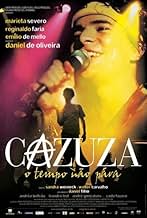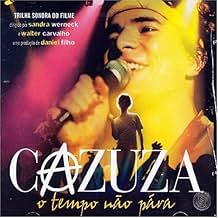Cazuza: O Tempo Não Pára
- 2004
- 1h 38m
IMDb RATING
6.9/10
4.5K
YOUR RATING
The life and times of Cazuza, Brazilian singer/poet/enfant terrible, from his start with rock group "Barão Vermelho", to his death from Aids, in 1990, showing his career, love affairs, and i... Read allThe life and times of Cazuza, Brazilian singer/poet/enfant terrible, from his start with rock group "Barão Vermelho", to his death from Aids, in 1990, showing his career, love affairs, and involvement with drugs.The life and times of Cazuza, Brazilian singer/poet/enfant terrible, from his start with rock group "Barão Vermelho", to his death from Aids, in 1990, showing his career, love affairs, and involvement with drugs.
- Directors
- Writers
- Stars
- Awards
- 23 wins & 18 nominations total
Vitor Hugo
- Bené
- (as Victor Hugo)
- Directors
- Writers
- All cast & crew
- Production, box office & more at IMDbPro
Featured reviews
It was very disappointing because I wanted to know about who was Cazuza, why he was writing those songs and saying how bad was his family, his class and the evil Brazil.
All I've discovered was a spoiled child that want to do everything he intend to. There were no repercussion about his real personal life and how he became friend of the Barao Vermelho's members again after their separation and discussions.
After all, its pointless to watch it if you have no idea about who is that guy, that Brazilian singer... The last part of the movie should't longer, it was the most dramatic part of his life and that kind of thing works on movies biographies. Maybe his mother didn't want to watch it or reaffirm the disease his is remembered for.
All I've discovered was a spoiled child that want to do everything he intend to. There were no repercussion about his real personal life and how he became friend of the Barao Vermelho's members again after their separation and discussions.
After all, its pointless to watch it if you have no idea about who is that guy, that Brazilian singer... The last part of the movie should't longer, it was the most dramatic part of his life and that kind of thing works on movies biographies. Maybe his mother didn't want to watch it or reaffirm the disease his is remembered for.
This film cannot be seen as a good piece of film as it is. Out of context, it has no special meaning besides the point it constantly tries to make of the clichés we have heard over and over again. That is, gay men taking drugs, having sex with everyone they see and being self-destructive. As it usually happens with Brazilian cinema, this movie doesn't try to break away from the national social basis and only repeats all the beliefs the citizens and foreigners have of the country and its own people. A very sad thing to do, a very bad message to pass. I watched this film remembering my mother telling me how horrible it is when people start smoking joints and end up dying of aids for sharing needles and being promiscuous. That's what everyone goes around saying in Brazil, in sensationalist terms, and this is how this film is presented. It is a true pity that such a good composer and singer had to be pictured in such horrible colours. And worst still that Brazil hasn't learnt how to do something new that will challenge the people to expand their way of thinking into new areas.
***** MAY CONTAIN SPOILERS *******
If you're not Brazil and have never lived here, you probably don't know Cazuza. But Brazilian people and lucky ones who lived in this country in the 1980's know this great composer and singer. In 1981 he begun his career as the singer of Barão Vermelho, that soon became one of the most popular Brazilian rock bands. With great heats playing on TV and radio, Cazuza and his band got fans all over the country. In 1985 he decided he wouldn't keep on playing with his mates and kicked out a solo career, that took five years. Cazuza had more success due to his talent and courage to sing everything he wanted. Unfortunately, he also kept on using drugs and with dangerous free sex habits. As a consequence, he got AIDS. Even after the discovery of this terrible disease, he kept on singing and showing no fear of showing the whole country the effects of AIDS. In 1990 he died. This is the story everybody (in Brazil at least) knows. This is what we saw on TV news, magazines and newspapers. The film shows it all in a beautiful, but at the same time strong, way. Daniel Oliveira plays the protagonist in a great way, and physically he really looks like Cazuza. Marieta Severo and Reginaldo Faria, two of the best Brazilian actors, play Cazuza's parents, who never left him alone. Walter Carvalho and Sandra Werneck direct this movie in a remarkably way. Cameras are never totally stopped. There's always some kind of movement, as if the cameramen had the cameras on their shoulders all the time. This gives a flavour of movement, that makes some kind of tense atmosphere.
My Rate 8/10
If you're not Brazil and have never lived here, you probably don't know Cazuza. But Brazilian people and lucky ones who lived in this country in the 1980's know this great composer and singer. In 1981 he begun his career as the singer of Barão Vermelho, that soon became one of the most popular Brazilian rock bands. With great heats playing on TV and radio, Cazuza and his band got fans all over the country. In 1985 he decided he wouldn't keep on playing with his mates and kicked out a solo career, that took five years. Cazuza had more success due to his talent and courage to sing everything he wanted. Unfortunately, he also kept on using drugs and with dangerous free sex habits. As a consequence, he got AIDS. Even after the discovery of this terrible disease, he kept on singing and showing no fear of showing the whole country the effects of AIDS. In 1990 he died. This is the story everybody (in Brazil at least) knows. This is what we saw on TV news, magazines and newspapers. The film shows it all in a beautiful, but at the same time strong, way. Daniel Oliveira plays the protagonist in a great way, and physically he really looks like Cazuza. Marieta Severo and Reginaldo Faria, two of the best Brazilian actors, play Cazuza's parents, who never left him alone. Walter Carvalho and Sandra Werneck direct this movie in a remarkably way. Cameras are never totally stopped. There's always some kind of movement, as if the cameramen had the cameras on their shoulders all the time. This gives a flavour of movement, that makes some kind of tense atmosphere.
My Rate 8/10
I was very interested in watching Cazuza. His story is well-known by most of the Brazilians that lived during the 80s rock moment. But Cazuza himself was not really explained in the movie. It was based in the book of Lucinha Araujo, Cazuza's mother, and it seems that she tried to convince herself and the others that she was a good mother and he was a good son. If you are a parent, you can take you own conclusion about this. All the self-destructive behavior of Cazuza doesn't fix in this scenario.From where it came from? For his rebellion with the homophobic world? Or it was a consequence of the inexistence of limits or punishments in a high-class Brazilian family? For who knows the story, the movie looks like a poor documentary. If Cazuza is considered the real Brazilian poet of the 80s, he deserved a better explanation.
Cazuza was the lead singer of Barao Vermelho, a Brazilian rock n'roll band, back in the early 80s. Their songs were distinguished by the creative work of Frejat, the guitar player. But it was Cazuza's strong, sexual, acid and ironic lyrics and attitude who made of him "the best poet of his generation" - according to Caetano Veloso. He followed a solo career during the second half of that decade, and died out of AIDS in 1990, aged 32.
The movie covers from his early 20s, the first rehearsals with Barao Vermelho, until his death. The apex of Barao at the first Rock in Rio, and the drama of discovering the disease. Expect a lot of sex, drugs and high quality 80s Brazilian rock n'roll.
Daniel Oliveira incorporates Cazuza in a way only seen before in the Jim Morrison/Val Kilmer possession during the shooting of The Doors. An special attention to the role of Lucinha, Cazuza's mother (and writer of the book upon which the movie was based), played here by the all-talented Marietta Severo.
Although one can notice some lack of resources in one or other scene - esp.the ones in stage - the story of the bisexual genius in his road to excess is told in the most wholehearted way.
The movie covers from his early 20s, the first rehearsals with Barao Vermelho, until his death. The apex of Barao at the first Rock in Rio, and the drama of discovering the disease. Expect a lot of sex, drugs and high quality 80s Brazilian rock n'roll.
Daniel Oliveira incorporates Cazuza in a way only seen before in the Jim Morrison/Val Kilmer possession during the shooting of The Doors. An special attention to the role of Lucinha, Cazuza's mother (and writer of the book upon which the movie was based), played here by the all-talented Marietta Severo.
Although one can notice some lack of resources in one or other scene - esp.the ones in stage - the story of the bisexual genius in his road to excess is told in the most wholehearted way.
Did you know
- TriviaCazuza's manager Zeca passed away in the same date he did, exactly twenty years later.
- ConnectionsReferenced in Mussum, Um filme do Cacildis (2019)
- SoundtracksCirco Voador
Written by Guto Graça Mello
Details
- Release date
- Country of origin
- Official sites
- Languages
- Also known as
- Cazuza: Time Doesn't Stop
- Production companies
- See more company credits at IMDbPro
- Runtime1 hour 38 minutes
- Color
- Sound mix
- Aspect ratio
- 1.85 : 1
Contribute to this page
Suggest an edit or add missing content

Top Gap
By what name was Cazuza: O Tempo Não Pára (2004) officially released in Canada in English?
Answer














